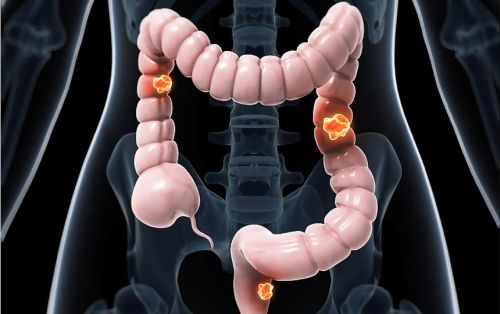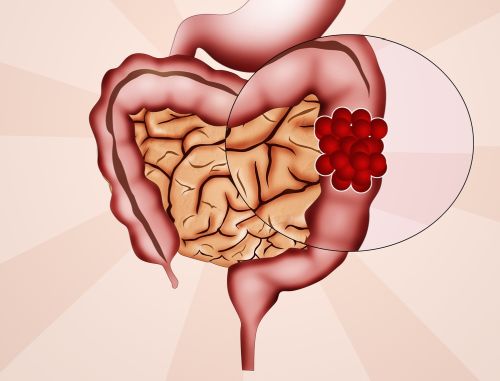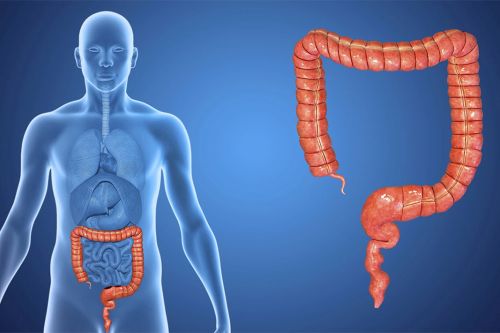It forms by the uncontrolled proliferation of cells on the inner surface of the colon. It usually develops from benign growths called polyps. Symptoms of colon cancer include abdominal pain, constipation, diarrhea, and bloody stools. The chance of treatment is high with early diagnosis. Age, family history, dietary habits, and a sedentary lifestyle are risk factors. Treatment usually includes surgery, chemotherapy, or radiotherapy.
What are the Symptoms of Colon Cancer?
 Changes in bowel habits such as diarrhea or constipation. The shape or consistency of the stool may change. Presence of blood in the stool or rectal bleeding. This can appear as bright red or dark red blood. Persistent or temporary abdominal pains. These pains can be cramp-like. Unexplained weight loss. This can happen without any changes in dietary habits. Constant fatigue or weakness, possibly due to anemia. A feeling of bloating or discomfort in the abdominal area. Darkening or lightening of the stool color. Fatigue, paleness, and weakness due to low iron levels. Severe abdominal pain, vomiting, and difficulty in passing stools. If one or more of these symptoms persist for a long time, it is important to consult a healthcare professional. The chance of treatment increases if colon cancer is diagnosed early.
Changes in bowel habits such as diarrhea or constipation. The shape or consistency of the stool may change. Presence of blood in the stool or rectal bleeding. This can appear as bright red or dark red blood. Persistent or temporary abdominal pains. These pains can be cramp-like. Unexplained weight loss. This can happen without any changes in dietary habits. Constant fatigue or weakness, possibly due to anemia. A feeling of bloating or discomfort in the abdominal area. Darkening or lightening of the stool color. Fatigue, paleness, and weakness due to low iron levels. Severe abdominal pain, vomiting, and difficulty in passing stools. If one or more of these symptoms persist for a long time, it is important to consult a healthcare professional. The chance of treatment increases if colon cancer is diagnosed early.
What Causes Colon Cancer?
 The risk increases in people with a family history of colon cancer. Also, certain genetic mutations can increase the risk. The risk of development is higher in individuals over the age of 50. The risk of cancer increases with age. High consumption of fat, red meat, and processed meat can increase the risk. Low consumption of fiber-rich foods also increases this risk. Chronic inflammatory bowel diseases, such as Crohn's disease and ulcerative colitis, increase the risk. Lack of physical activity, obesity, smoking, and excessive alcohol consumption are other risk factors. Certain types of polyps that develop in the intestine can turn into cancer over time. Apart from these factors, colon cancer can sometimes develop without any apparent cause. Regular screenings are important, especially for those in risk groups, as early diagnosis greatly increases the treatability of cancer.
The risk increases in people with a family history of colon cancer. Also, certain genetic mutations can increase the risk. The risk of development is higher in individuals over the age of 50. The risk of cancer increases with age. High consumption of fat, red meat, and processed meat can increase the risk. Low consumption of fiber-rich foods also increases this risk. Chronic inflammatory bowel diseases, such as Crohn's disease and ulcerative colitis, increase the risk. Lack of physical activity, obesity, smoking, and excessive alcohol consumption are other risk factors. Certain types of polyps that develop in the intestine can turn into cancer over time. Apart from these factors, colon cancer can sometimes develop without any apparent cause. Regular screenings are important, especially for those in risk groups, as early diagnosis greatly increases the treatability of cancer.
How is Colon Cancer Diagnosed?
 The doctor may ask about your family health history to assess the risk of colon cancer. Symptoms such as abdominal pain, weight loss, and blood in the stool are queried. An abdominal examination is performed to check for any abnormalities. Tests can be done to check for hidden blood in the stool. These tests are useful in detecting early signs of cancer. Blood tests can be done for signs of anemia. Additionally, certain markers (e.g., CEA) can indicate the presence of cancer. A thin tube is used to examine the inside of the colon. The doctor uses this test to see polyps or abnormal growths. If necessary, a biopsy may be performed. A CT scan is used to obtain detailed images of the abdominal area. It is useful for assessing the spread of tumors. In complex cases or where other imaging methods are insufficient, an MRI may be used. A tissue sample taken during a colonoscopy or surgery is examined in a laboratory setting. A biopsy is the most reliable method for making a definitive diagnosis. The biopsy result provides information about the presence, type, and stage of cancer. This information is critical in determining the treatment plan. Early detection of cancer is crucial for the success of the treatment process. If you experience symptoms of colon cancer, it is important to consult a healthcare professional.
The doctor may ask about your family health history to assess the risk of colon cancer. Symptoms such as abdominal pain, weight loss, and blood in the stool are queried. An abdominal examination is performed to check for any abnormalities. Tests can be done to check for hidden blood in the stool. These tests are useful in detecting early signs of cancer. Blood tests can be done for signs of anemia. Additionally, certain markers (e.g., CEA) can indicate the presence of cancer. A thin tube is used to examine the inside of the colon. The doctor uses this test to see polyps or abnormal growths. If necessary, a biopsy may be performed. A CT scan is used to obtain detailed images of the abdominal area. It is useful for assessing the spread of tumors. In complex cases or where other imaging methods are insufficient, an MRI may be used. A tissue sample taken during a colonoscopy or surgery is examined in a laboratory setting. A biopsy is the most reliable method for making a definitive diagnosis. The biopsy result provides information about the presence, type, and stage of cancer. This information is critical in determining the treatment plan. Early detection of cancer is crucial for the success of the treatment process. If you experience symptoms of colon cancer, it is important to consult a healthcare professional.
How is Colon Cancer Treated?
Removing the tumor is the most common treatment method. The cancerous tissue is surgically removed along with the surrounding healthy tissue. If the tumor causes extensive tissue loss in a part of the colon, part of the colon is brought to the body surface and a colostomy bag is used. Medications are used to stop the growth and spread of cancer cells. It is usually applied after surgery to eliminate residual cancer cells. Neoadjuvant chemotherapy can be used before surgery to shrink the tumor. Radiation therapy aims to destroy cancer cells using high-energy beams. It can be used before or after surgery, especially when the tumor cannot be completely removed. Medications targeting specific molecular targets in cancer cells are used. This treatment can help inhibit the growth of cancer cells. Immunotherapy boosts the body's immune system. It aims to create a more effective response against cancer cells. It can be applied especially for metastatic colon cancer. The opportunity to participate in clinical trials to try new treatment methods under research. This can increase the available treatment options for patients. Regular check-ups are conducted to monitor the patient's condition after treatment. Lifestyle changes are recommended to reduce the risk of cancer recurrence. These treatment methods can often be used together. A specific treatment plan is created based on the patient's condition. Each patient's treatment process is individual and should be determined by a specialist oncologist.


